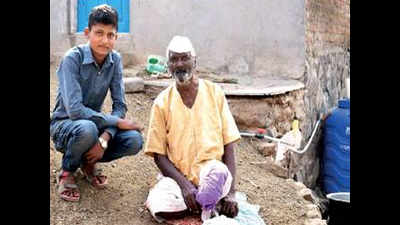- News
- City News
- mumbai News
- Marathwada students quit studies to find jobs
Trending
This story is from February 17, 2019
Marathwada students quit studies to find jobs

Praveen Shirwale dropped out because he could not afford travel expenses
MUMBAI: In the parched belt of Marathwada where families are struggling to survive, children of farmers have been forced to give up studies and find jobs.
Both Praveen Shirwale and his younger sister have dropped out. "Of the 30-35 children in my class in Class VII, only around 10 are still studying," he says. Praveen had won a scholarship of Rs 4,000 in Class VII.He used to pay for entrance fees to the course but then found he could not continue. "I wanted to sit for the MPSC exam," he says.
His neighbour in the same village, 18-year old Komal Goshir, could not enrol for a nursing course after her Class XII. She has been at home for four months now. Her brother stopped studying three years ago and works as a waiter in Pandharpur. The family survives on his Rs 3,000 a month pay.
"This is the end of Komal's education," says her mother Manda Goshir. Their one-acre field had no crop this year. "As soon as we save some money, we will get her married."
In Chumbali village, another Komal has given up her dream. Seventeen-year-old Komal Poval wanted to do a three-year degree in dressmaking but had to stop after a year. The family needed someone to stay home with her 80-year-old grandmother Baijabai Poval while the rest migrated in search of work. "She is too old to manage alone," says Komal.
Meanwhile, Avinash Garaokar in Kotan has managed to hang on to his education by working as a mason during the summer. 'I earned Rs 3,000 and used that for the fee," says the Class XII student from the Ashwalinga Vidyalaya, who scored 81% in his Class X. Yet, the irony is even if he makes it, there aren't many jobs out there. Census data shows there were 15 million fewer farmers in 2011 than counted in 1991. "Most became landless farm labourers. Lakhs went to other villages and cities in search of jobs that are not there," says P Sainath, founder-editor, People's Archive of Rural India.
Both Praveen Shirwale and his younger sister have dropped out. "Of the 30-35 children in my class in Class VII, only around 10 are still studying," he says. Praveen had won a scholarship of Rs 4,000 in Class VII.He used to pay for entrance fees to the course but then found he could not continue. "I wanted to sit for the MPSC exam," he says.
His neighbour in the same village, 18-year old Komal Goshir, could not enrol for a nursing course after her Class XII. She has been at home for four months now. Her brother stopped studying three years ago and works as a waiter in Pandharpur. The family survives on his Rs 3,000 a month pay.
"This is the end of Komal's education," says her mother Manda Goshir. Their one-acre field had no crop this year. "As soon as we save some money, we will get her married."
Komal's fate is not unusual. "Faced with strained resources, families prefer to get girls married instead of paying for their education. And if faced with a choice, the education of the son gets preference over the daughter's," says Narendra Kale, academic council member, Babasaheb Ambedkar Marathwada University.
In Chumbali village, another Komal has given up her dream. Seventeen-year-old Komal Poval wanted to do a three-year degree in dressmaking but had to stop after a year. The family needed someone to stay home with her 80-year-old grandmother Baijabai Poval while the rest migrated in search of work. "She is too old to manage alone," says Komal.
Meanwhile, Avinash Garaokar in Kotan has managed to hang on to his education by working as a mason during the summer. 'I earned Rs 3,000 and used that for the fee," says the Class XII student from the Ashwalinga Vidyalaya, who scored 81% in his Class X. Yet, the irony is even if he makes it, there aren't many jobs out there. Census data shows there were 15 million fewer farmers in 2011 than counted in 1991. "Most became landless farm labourers. Lakhs went to other villages and cities in search of jobs that are not there," says P Sainath, founder-editor, People's Archive of Rural India.
End of Article
FOLLOW US ON SOCIAL MEDIA










